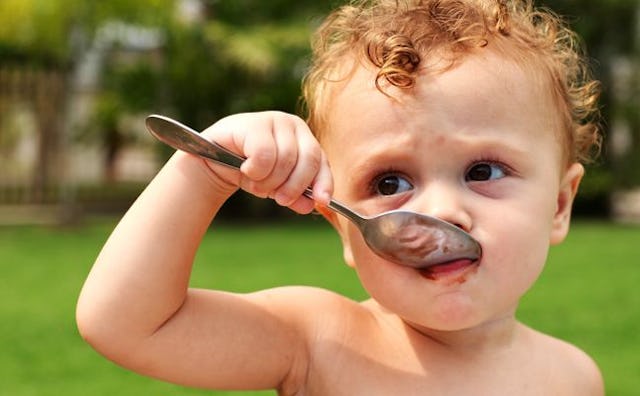Our Son's Father Is A Donor, Not A Dad

It’s been said many times that anyone can be a father, but it takes a real man to be a dad. Dads are the splinter-in-your-finger removers, soccer coaches, heart fixers, monster eradicators, protectors, teachers and biggest supporters. It is a privilege for a man to be a dad, and the sacrifices made by dedicated dads should never be taken for granted or looked over. Dads are important.
I say all of this because I have a great dad, who has loved and supported me from the moment I was born, who has thought of me first, who has taught and helped and listened when I needed him. I attribute a lot of who I am to my dad.
And my son won’t have one.
My son doesn’t have a dad. He has a donor. Donor 12X54 to be exact. Some 28-year-old, 5’11 guy who is great at math, likes whales, doesn’t own a TV, rides his bike to work, does yoga and has brown eyes. Donor 12X54 gave us the missing piece to create the love of our lives. Maybe he did it because he loves the idea of helping people make families when they can’t on their own. Maybe he needed 500 bucks. Either way, his contribution is priceless, and without him I wouldn’t know the incredible bond between a mother and son.
But he’s a donor, not a dad.
I don’t mind telling people our story, and one day I will tell my son the story. And I will tell him the truth. I’m not ashamed of the way we created a family. I am looking forward to seeing what parts of him come to be that don’t come from my wife or myself. I am not embarrassed that we used a donor to make this beautiful boy.
But when well-meaning friends ask if our little guy got his gorgeous skin complexion from his “dad,” or even try to comprehend what it would be like to have a baby “and not know who the dad is,” it makes me squirm a little bit. I don’t know who his dad is because he doesn’t have one. He has two moms. We are his family. We are his parents. He doesn’t have a dad, and that is OK. His olive skin comes from his donor, not his dad. And when the older lady in the store says “having a baby with a stranger is just weird,” my heart lurches at the ignorance. I didn’t have a baby with a stranger. I had a baby with Sarah, my partner, my soul mate, my best friend. Sarah and I made a decision to have a baby, and the only way to do that was to find a donor. And that’s exactly what he is: a donor, not a dad.
Last time I checked, Donor 12X54 hadn’t changed a dirty diaper, been to a doctor’s appointment, been up at 2:30 in the morning with a newborn, read Brown Bear, Brown Bear 1000 times, taught him not to hit, to be gentle, to say please or put Mickey Mouse band-aids on boo-boos. Donor 12X54 won’t cry on the first day of kindergarten, buy him a tux for prom or watch him graduate. He won’t have the birds and the bees talk and won’t listen as he has his heart broken for the first time. That is because he’s a donor, not a dad.
Sarah and I will be his parents for the rest of his life, a responsibility we don’t take lightly. We know how blessed we are to have him. We know how vital our roles are in his life. We know what a big responsibility it is to raise a boy into a man.
We did it with the help of Donor 12X54, but he’s a donor, not a dad.
Our son will not be without positive male role models. He has uncles and grandfathers and family friends who will show him what it means to be a man. We are adamant about fostering these relationships so he does grow up with men to look up to. He doesn’t need a dad to be a healthy, happy and productive boy. He needs a family and a support system that love him like crazy and are committed to teaching, encouraging and protecting him. And he has that already.
Referring to Donor 12X54 as a dad is giving him a title he didn’t ask for or earn. It is, in a way, discrediting our roles as parents by giving credit to someone who is clearly not OUR son’s parent.
We are forever thankful to donor 12X54, but he is a donor, not a dad.
This article was originally published on